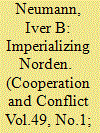| Srl | Item |
| 1 |
ID:
129444


|
|
|
|
|
| Publication |
2014.
|
| Summary/Abstract |
The two pre-Napoleonic Nordic polities are best understood as empires. Drawing on recent analytical and historical scholarship on empires, I argue that 17th and 18th century Denmark, on which the piece concentrates, was very much akin to the other European empires existing at the time. Read in this light, national identities within the fragments of the empire appear similar. Nationalisms are all shaped directly on the Danish model, having at the same time Denmark as their constitutive cultural other. The introduction notes that, where all European imperial experiences are concerned, overseas territories had the most wounds inflicted upon them. We would not know this if we considered Faroese, Icelandic and Norwegian nationalism in isolation. These polities, Norway in particular, participated in and benefited from the colonial policies of the empire. This notwithstanding, their national identities insist that these nations were on the receiving - as opposed to the imposing - end of imperialism. This is a historically unwarranted and ethically problematic stance requiring further discussion.
|
|
|
|
|
|
|
|
|
|
|
|
|
|
|
|
| 2 |
ID:
095983


|
|
|
|
|
| Publication |
2010.
|
| Summary/Abstract |
Despite a general acknowledgement that knowledge about identities is essential for understanding international relations, surprisingly little has been written about what actually activates one of a state's many identities and not another. More generally, the article suggests that situational relevance and commitment are of importance. More specifically, it is suggested that a policy area's legitimisation is a factor that may affect the commitment to a collective identity. The argument is illustrated by the case of 'Norden', as the inhabitants of Denmark, Iceland, Norway and Sweden call their territory. The end of the Cold War and Sweden and Finland joining Denmark in the European Union (EU) put Nordic identity under severe stress in the beginning of the 1990s. As shown, this collective identity was intensely active in the case of the Nordic Passport Union, but less so in the case of environmental negotiations.
|
|
|
|
|
|
|
|
|
|
|
|
|
|
|
|